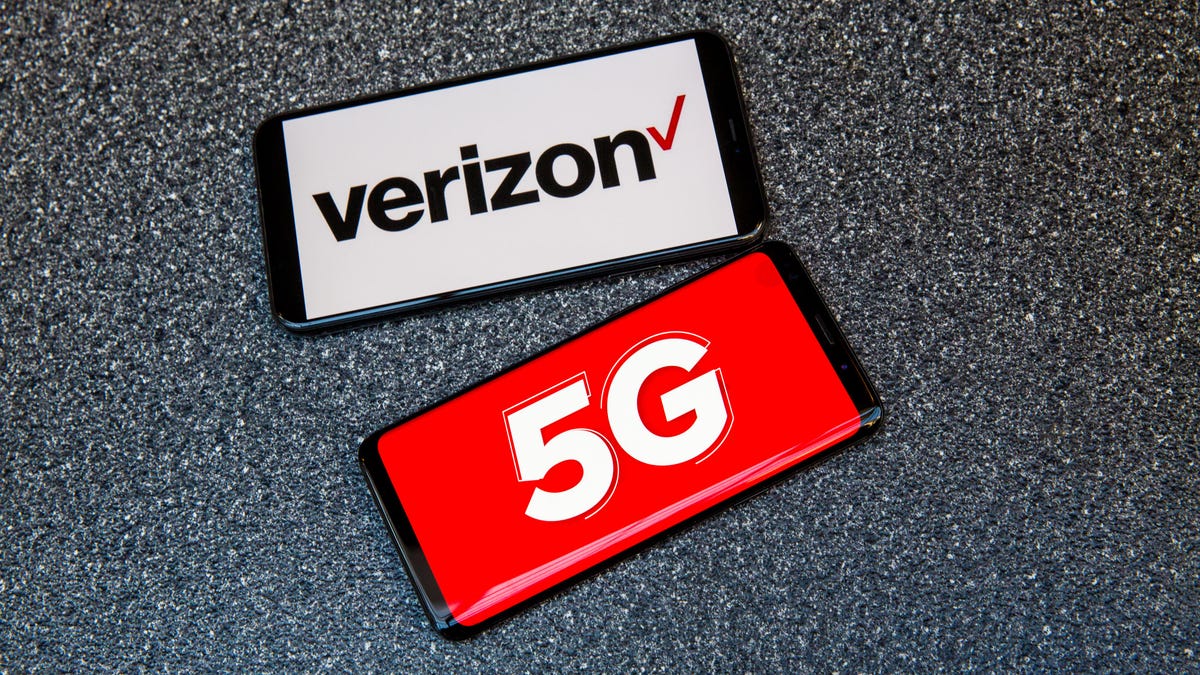Verizon went big in the recent FCC spectrum auction for midband wireless spectrum and now it's starting to reveal when and how it will put that purchase to use. During an analyst event Wednesday night, CEO Hans Vestberg touted that the purchase was a "once-in-a-lifetime opportunity."
Known as C-band, the midband spectrum has been viewed by the wireless industry as a key technology for offering faster 5G performance than wider-ranging low-band networks while covering larger areas compared to faster millimeter-wave 5G. Verizon says that this new spectrum will allow it to offer peak download speeds of 1 gigabit per second.
The FCC auction totaled a record $81 billion, with Verizon the largest spender. The carrier revealed Wednesday that it shelled out $52.9 billion, including incentive payments and clearing costs, to acquire and help make the spectrum available for its use.
While much of the new spectrum will take time to become available, Verizon says it will start deploying this midband 5G in 46 markets later this year, covering 100 million people by next March. That number will grow to 175 million people between 2022 and 2023 and over 250 million people in 2024.
Existing phones -- including the new Samsung Galaxy S21 family as well as last year's Apple iPhone 12 line and Google Pixel 5 -- already include support for C-band 5G, with Verizon Consumer CEO Ronan Dunne saying that all of the carrier's new 5G phones going forward will be able to tap into the spectrum. While the iPhone 12 and Pixel 5 will support C-band, the carrier confirmed that other 2020 5G devices, including Samsung's Galaxy S20 line and Z Fold 2 foldable, will not be compatible with the new airwaves.
Dunne told CNET on Thursday that while the building for C-band is starting now, the new network won't go live until Verizon gets access to the spectrum in December.
Those looking to get the faster 5G on their phones, however, will need to make sure to have the right plan. While Verizon makes its slower nationwide 5G available on all of its plans, it requires a "premium" unlimited plan to use its fastest millimeter-wave 5G. This requirement will expand to C-band, with Verizon revealing that only those with premium unlimited plans will be able to take advantage of this connection.
Premium unlimited plans include its existing Do More, Get More and Play More unlimited plans as well as those with its older Above Unlimited and Beyond Unlimited plans.
Making a new play for home internet
Verizon has new Home Internet products, including Gateways for connecting to the service and a new Smart Display.
Beyond improving its 5G for wireless users, the nation's largest carrier also detailed an expansion for its wireless home broadband product. By the end of 2021, Verizon expects to cover 15 million people with either 4G LTE or 5G home internet service, with that number growing to 30 million by the end of 2023 and 50 million by the end of 2025. The company expects most of its home internet customers to be on 5G by 2023, and all of them by 2025.
Verizon already offers millimeter-wave-based 5G home internet, what it calls 5G Home, in 18 markets with peak download speeds of 1Gbps. The 5G Home product will expand to include C-band 5G support as it becomes available later this year.
Verizon's 4G LTE Home Internet service offers download speeds between 25 and 50Mbps for $40 per month for Verizon wireless customers ($60 per month for those who don't have a Verizon cell phone plan). Its 5G Home offering offers "typical download speeds of 300Mbps" and runs $50 per month if you also have a compatible Verizon cell phone plan ($70 per month if you don't have Verizon or lack the right plan).
Like T-Mobile, which is working on its own 5G home internet offering, Verizon plans to expand its 5G internet product to businesses. T-Mobile recently announced a new Home Office Internet designed for enterprises, with Verizon countering Wednesday night by revealing an expansion for its 5G Business Internet in 2021.
Already available in Chicago, Houston and Los Angeles, Verizon says it will bring the product to "more than 20 markets" this year. The carrier did not, however, go into detail on exactly where those markets might be or when the service would be available.
A needed 5G boost amid increased competition
The C-band expansion should give Verizon a much-needed boost in its 5G performance. Whereas the carrier boasts of fast speeds on its millimeter-wave network, that 5G service is only generally available outdoors in parts of certain cities. Its nationwide 5G network, which uses a combination of 4G and 5G technologies, is more widely available, but offers an experience that is largely similar -- if not sometimes slower -- than its 4G LTE.
While it may take some time before it appears, the new C-band should allow Verizon to begin to counter T-Mobile when it comes to 5G network performance.
T-Mobile, which has a built a strong lead when it comes to US 5G deployment, has been touting its improved 5G service with a low-band network that covers more people than Verizon's nationwide offering and an already deployed midband network that it says offers can provide average download speeds of 300Mbps, with peaks of 1Gbps.
Thanks to its purchase of Sprint last year, T-Mobile has already begun broadly deploying midband 5G, revealing on Wednesday that it already covers 125 million people, while reaffirming that it plans to reach 200 million people by the end of 2021.
T-Mobile is expected to detail some of its network improvements when it hosts its own analyst event Thursday, while AT&T is expected to follow suit on Friday.


